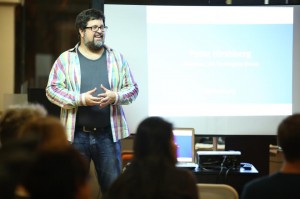Posts Tagged egypt
Egypt: More Than the Power of the Network, It’s Also Pervasive, Simple and Cheap
Posted by cheuer in economy, Future of Media, Insytes, Leadership, Web2.0 on January 30th, 2011
 Broadly I agree with Matthew Ingram in his post It’s Not Twitter or Facebook, It’s the Power of the Network, though I think the Foreign Policy columnist Evgeny Morozov he cites is missing the point. It is seemingly clear that the tools, and Social Media broadly, played a crucial role in changing the rules of the game and the perception of reality on the streets. While those I have called “Digital Utopians” are often overly engaged in puffery, not willing to see the potential negatives and overstating the importance of these tools relative to an everyday person’s perspective, there are a few other factors are at the core of this disruption, though they are perhaps more nuanced.
Broadly I agree with Matthew Ingram in his post It’s Not Twitter or Facebook, It’s the Power of the Network, though I think the Foreign Policy columnist Evgeny Morozov he cites is missing the point. It is seemingly clear that the tools, and Social Media broadly, played a crucial role in changing the rules of the game and the perception of reality on the streets. While those I have called “Digital Utopians” are often overly engaged in puffery, not willing to see the potential negatives and overstating the importance of these tools relative to an everyday person’s perspective, there are a few other factors are at the core of this disruption, though they are perhaps more nuanced.
IMHO, it’s not just the network as Matthew credits, but the acceptance of, and understanding of its use – ie, it’s a mindset created by the pervasive and daily use of the Web and social media in aggregate (to Dave Winer’s point) – though crediting Facebook and Twitter are merely a convenient short hand reference that is illustrative of everything else. It’s a mental outlook on the world that is helping individuals to feel more empowered and hopeful for a better existence instead of beaten down by despair. This is amplified as the media gives credit to the tools (making more people see their power) and the word of mouth that such broadcasts create that changes the collective outlook.
But this wasn’t happening 15 years ago when we were originally logging on and talking about network effects. It’s only happening today because of the percentage of the world that has adopted social media as a set of communications and connection tools. It’s happening because the technology is much more simple to use at nearly zero cost (when most people have the hardware in their back pockets, and services like Twitter and Facebook don’t require credit cards or monetary exchange, that equals nearly zero cost in my book). It’s a mindset that has changed in many who are no longer feeling voiceless, powerless and unable to create change. It’s a mindset that enables people to believe that they can truly “be the change you want to see in the world.”
And it didn’t happen merely because of the network and its power, though referencing it is also a convenient short hand. It happened because the network was made easy to use and accessible by a sufficient percentage of citizens. When it is blocked, it creates a great feeling of helplessness in many, and the knowledge required to route around it to use hacker tools is a high enough barrier to prevent entry for most… but even these are becoming easier to get past. Once those ‘alternative access’ tools are inexpensive and easy to use by a greater number, it won’t be possible to effectively deploy an Internet kill switch.
And yes, it’s a network effect that helps drive it, but the tipping point, and the reason social media deserves more credit then its detractors would give, is largely because we have made many of the tools much easier to use and more widely available, not just because the network is there.
Going even deeper, it is further supported by the perception of the power that spreads as people credit many of the tools for either receiving or sending communications. So it takes on a “life of its own” relative to its importance. At the end of the day, it’s the people and the changes in perception they have of what’s possible and what is not that is really powerful.
I won’t get into the power of prayer, or the Tao of Physics too deeply here, but in closing I would just add that many believe our remote amplification of positive thoughts and well wishes does indeed create just the tiniest amount of energy that supports different outcomes. So while the fact that we are tweeting or retweeting the happenings over there is not the cause of the outcome, I suspect that we, the human network – like the trees in Avatar – are indeed contributing, if only in the slightest most infinitesimal way.
At the very least, we know anecdotally that within the sea of noise that is created, sometimes there is a needle found in the haystack that practically and actually does get help delivered where it is needed. While the network is to be credited, if it weren’t pervasive, simple to use and cheap, I wouldn’t be writing this and you wouldn’t be reading it.
